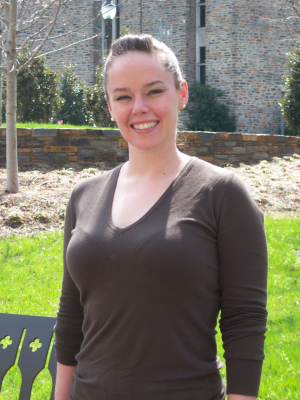It’s only natural that Emily Skarbek found her way to the Center for the History of Political Economy. She completed her doctoral work in 2009 at George Mason University, which has a history-of-thought focus, and she has always included the history of economics in her courses, putting the ideas she presents to her students in a historical perspective. That pedagogical practice will benefit greatly from her experience at the Center. Over the past year she has sat in on history-of-thought courses and has observed not only how the faculty approach the classic primary texts—Smith’s Wealth of Nations and Theory of Moral Sentiments, for instance—but the reactions of students, most of whom are encountering those texts for the first time. Witnessing Kevin Hoover’s dialogue with his students in his course on the philosophy and methodology of economics, as well as Neil De Marchi’s interdisciplinary approach in his course on Adam Smith and Bernard Mandeville, has opened up for Emily new ways to teach the history of economics.
“Seeing how students respond to material, what they respond to, what they don’t respond to, will help me make a case for developing a history of economic thought course in the future,” Emily says. “I’m a big supporter of the Center’s project to bring the history of economics back into the economics curriculum. My experience here will help me make a case for doing that.”
In her research, Emily, a 2011–12 Research Fellow of the Center, combines political economy with the history of economic thought. Two of her primary interests are Hayek’s theory of markets and price systems and his theory of institutional evolution, especially the latter’s relation to the Scottish Enlightenment. “Hayek drew heavily from Smith and Mandeville, and the connections between their ideas and Hayek’s are fascinating to explore,” Emily says. During her time at the Center, she has combined her work on those subjects with empirical work on the Chicago Fire of 1871. Using archival data, she is researching the pattern of donations sent to Chicago in response to the fire and its connection to Adam Smith’s notion of sympathetic agency and Alexis de Tocqueville’s ideas of local democratic governance.
For Emily, one of the chief satisfactions of being at Duke this past year has been the opportunity to explore the materials in the Economists’ Papers Project. “It’s been a wonderful experience, to browse and discover, to see what’s there; they are amazing resources, the Samuelson papers, the Machlup papers, the Hayek papers—you don’t know what you’re going to find.”
Having several year-long Fellows at the Center has made Emily’s tenure here especially gratifying. “It’s has been so important for the coherence of the experience. It was been great to catch up and resume relationships as other fellows research and develop projects throughout the year.”
—Paul Dudenhefer
